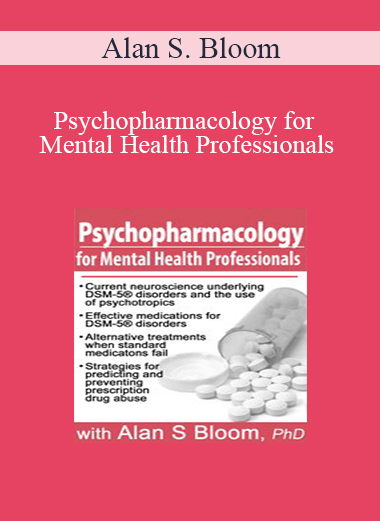- Faculty:
- Alan S. Bloom
- Duration:
- 6 Hours 7 Minutes
- Format:
- Audio and Video
- Copyright:
- Feb 06, 2019
Description
| Manual – Psychopharmacology for Mental Health Professionals (4.48 MB) | 65 Pages | Available after Purchase |
Outline
PSYCHOPHARMACOLOGICAL FOUNDATIONS
Core Pharmacological Principles
- Brain structures & circuits involved in:
- Emotional regulation
- Executive function & inhibitory control
- Reward & pleasure
- Learning & memory
- Receptors and neurotransmitters important in the actions of psychopharmacological agents
- Biogenic amines
- Excitatory & inhibitory neurotransmitters
- Endorphins & endocannabinoids
Your Role in Combined Psychological & Pharmacological Treatments
- Collaboration & communication with prescribing professionals
- Managing the combined treatments
- Referrals for medication
- Client psycho-education
- Monitoring drug effects & side effects
- Promoting adherence to combined treatments
DRUGS USED IN THE TREATMENT OF DSM-5® MENTAL DISORDERS
Depressive Disorders
- Neurobiology of depression
- Drugs used to treat depressive disorders
- Selective Serotonin Reuptake inhibitors (SSRIs)
- Effects, side effects and cautions
- Suicide risk & discontinuation syndrome
- Serotonin syndrome
- Selective Serotonin Reuptake inhibitors (SSRIs)
- Serotonin-Norepinephrine Reuptake Inhibitors (SNRIs)
- Effects, side effects, and cautions
- Atypical antidepressant agents
- Effects, side effects, and cautions
- Tricyclic antidepressants (TCAs)
- Effects, side effects, and cautions
- Why were newer drugs needed?
- MAO inhibitors
- Effects, side effects, and cautions
- Choosing an antidepressant
- What if first-line antidepressants do not work?
- Augmentation with antipsychotics
- What about herbs like St. John’s Wort?
Schizophrenia Spectrum Disorders
- Biological theories of schizophrenia
- ”Typical” & “atypical” antipsychotic drugs
- Effects, side effects & cautions – similarities & differences
- Latest evidence-based comparisons
- Drugs for treatment-resistant schizophrenia
- Other uses of antipsychotic drugs
Bipolar Disorders
- Biological theories for bipolar disorders
- Drugs used to treat bipolar disorders
- A prototype agent-lithium
- Effects, side effects & cautions
- Anticonvulsants
- Effects, side effects & cautions
- Antipsychotics – approved agents
- Combination drug therapy
- A prototype agent-lithium
Anxiety, Obsessive-Compulsive & Sleep-Wake Disorders
- The neurobiology of anxiety-related disorders
- The structure of sleep
- Drugs used in the treatment of anxiety & insomnia
- Benzodiazepines & Benzodiazepine-like drugs
- Misuse of these drugs in treatment
- SSRI’s & other drugs used to treat anxiety
Attention-Deficit/Hyperactivity Disorder & Neurocognitive Disorders (Dementia)
- ADHD
- Psycho-stimulants
- Effects, side effects & cautions
- Alpha-Adrenergic Agonists
- Psycho-stimulants
- Major neurocognitive disorders
- Drugs used in the treatment of cognitive impairment
- Future treatments
Prescription Drug Abuse
- Mental disorders & risk of comorbid prescription drug abuse
- Classes of drugs that are frequently abused
- Stimulants
- Sedative-hypnotics
- Opiates
- Strategies for the prevention & early identification of prescription drug abuse
LIMITATIONS OF RESEARCH AND POTENTIAL RISKS
Faculty
Alan S. Bloom, Ph.D. Related seminars and products: 1
Alan Bloom, Ph.D., is a professor of pharmacology and toxicology at the Medical College of Wisconsin. He earned a joint Ph.D. in psychology and pharmacology and consults regularly with psychiatrists and attorneys in drug abuse and other pharmacology related cases. Dr. Bloom has conducted extensive research on the impact of drugs of abuse (marijuana, cocaine, etc.) on the brain through use of functional magnetic resonance imaging (fMRI). His studies have been funded by the NIH and other national organizations and reported in an extensive number of publications and presentations. Dr. Bloom has served on the NIDA center grant review panel and is an appointed member of the Controlled Substance Board of the State of Wisconsin. He is a strong and experienced presenter providing lively, information-packed seminars.
Speaker Disclosures:
Speaker Disclosures: Speaker Disclosure: Financial: Alan Bloom is a Professor of Pharmacology and Toxicology at the Medical College of Wisconsin. He receives a speaking honorarium from PESI, Inc.
Non-financial: Alan Bloom is the vice-chair for the State of Wisconsin Controlled Substances Board.
Delivery Method
– After your purchase, you’ll see a View your orders link which goes to the Downloads page. Here, you can download all the files associated with your order.
– Downloads are available once your payment is confirmed, we’ll also send you a download notification email separate from any transaction notification emails you receive from coursesblock.com.
– Since it is a digital copy, our suggestion is to download and save it to your hard drive. In case the link is broken for any reason, please contact us and we will resend the new download link.
– If you cannot find the download link, please don’t worry about that. We will update and notify you as soon as possible at 8:00 AM – 8:00 PM (UTC 8).
Thank You For Shopping With Us!







